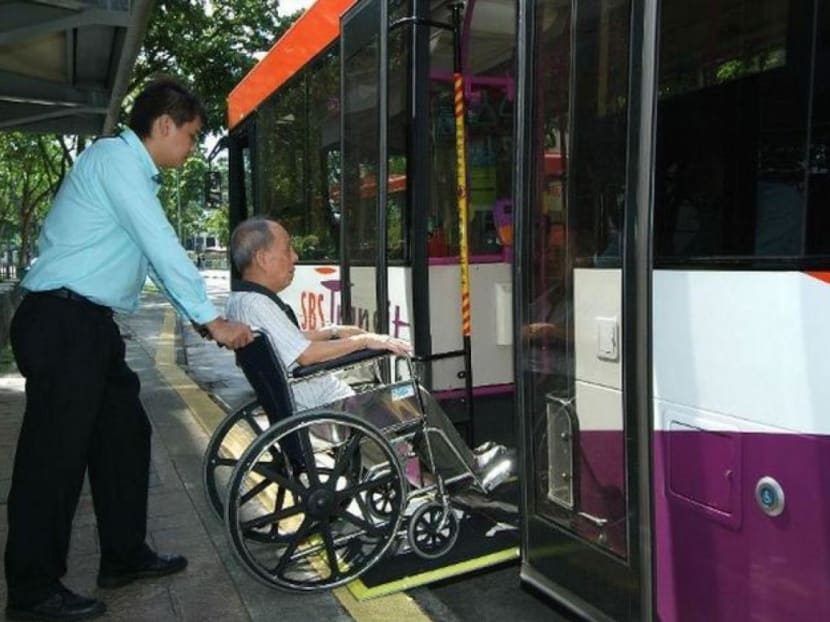Persons with disabilities markedly more satisfied with Singapore public transport in 2022: Survey
SINGAPORE — Satisfaction levels with public transport among persons with disabilities jumped markedly in 2022, based on a survey by the Public Transport Council (PTC).

- The second Public Transport Council survey of persons with disabilities and their carers found that their satisfaction levels with public transport had increased
- The first such survey was in 2021, with a mean rating of 7.2 out of 10, which rose in 2022 to 7.6 out of 10
- A survey of the wider community found that the mean satisfaction rating held steady at 7.8 out of 10, the same level since 2019
SINGAPORE — Satisfaction levels with public transport among persons with disabilities jumped markedly in 2022, based on a survey by the Public Transport Council (PTC).
In the second such survey, the council found that the overall satisfaction rating among this group of public transport users rose to 7.6 out 10 on average, up from 7.2 in 2021, the first year the survey was done.
The latest survey was done from Sept 26 to Oct 28 and involved 309 persons with disabilities along with 228 of their carers.
The results were released on Monday (Feb 13) along with a survey on satisfaction levels among the wider community on public transport. The figures for the wider community held steady at a mean rating of 7.8 out of 10, unchanged since 2019.
A MORE INCLUSIVE SOCIETY
As part of Singapore's push to become a more inclusive society, efforts have been made in recent years to make public transport more accessible to persons with disabilities.
For example, information from SG Enable shows that more than half of public buses in Singapore are wheelchair-accessible and can be identified through a blue passenger-on-wheelchair decal at the front of the bus.
SG Enable is the main government-linked agency for persons with disabilities. It was established in 2013 and falls under the Ministry of Social and Family Development.
In August last year, Singapore's Enabling Masterplan 2030 was unveiled, including an announcement to install the first all-hours audible traffic signals to assist sight-impaired pedestrians.
Bus interchanges are equipped with tactile ground surface indicators to guide visually impaired commuters, while guide dogs are also allowed on buses.
Concession cards for persons with disabilities give up to 55 per cent discount off adult fares when card users travel on public buses and trains.
PTC said in its statement: “We will continue to foster a gracious and caring commuter culture through efforts under the Caring SG Commuters committee to ensure our public transport system remains inclusive to all."
WHAT TRANSPORT OPERATORS SAY
Responding to TODAY's queries on Tuesday, transport operator SBS Transit said that besides training its frontline staff to help passengers with disabilities, it has also introduced initiatives to help them travel "safely and with confidence" on buses and trains.
These include its "Travel Buddy" programme, where persons with disabilities are accompanied on their regular routes by trained staff; the use of portable, trolley-like equipment to move a wheelchair up or down a flight of stairs when the lifts are not working; and using murals and floor stickers to help persons with dementia navigate bus interchanges and MRT stations safely.
Mrs Grace Wu, SBS Transit's vice-president (special grade) for customer experience and communications, added: "We recognise that more that can be done, and remain committed to expand our efforts by working with social service agencies to explore new initiatives and enhance existing ones."
Meanwhile, Tower Transit Singapore (TTS) said that the results of the survey were "very encouraging, and validate our efforts at making bus rides more inclusive and welcoming for people with disabilities".
The company said that it worked with various social service agencies last year to conduct courses to help persons with disabilities "regain their confidence to take the bus".
"We also ran the Public Bus Inclusivity Course to equip the public, especially students, to offer assistance to people with disabilities on the bus," TTS said.
"To foster greater inclusiveness amongst our frontline staff, we give out an inclusivity award each month to employees who receive compliments for rendering assistance to passengers with disabilities.", it added.
CRITERIA USED IN PTC SURVEYS
In both surveys released on Monday, PTC asked respondents to give a rating out of 10 on eight criteria, with a rating of six deemed to be "satisfactory":
- Safety and security
- Waiting time
- Reliability
- Service information
- Bus interchange / bus stop / MRT station accessibility
- Comfort
- Travel time
- Customer service
SATISFACTION LEVELS FOR PERSONS WITH DISABILITIES
The survey for persons with disabilities included those with a physical disability, who are deaf or have difficulty hearing, have visual impairment, have intellectual disability and autism, PTC said.
The improved ratings were recorded in all areas of the survey.
For MRT services, respondents were most satisfied with service information, with a mean score of 7.7. Reliability was ranked as the most important attribute overall for trains by commuters, with a mean score of 7.6.
Respondents for bus services were most satisfied with safety and security — with a mean satisfaction score of 7.8. It also ranked as the most important service attribute by respondents.
The biggest improvement came in the area of waiting time, with the average rating moving up to 7.4 from 6.5 in 2021.
Wheelchair user Kishon Chong — who is also a customer experience and inclusivity officer at TTS — said the results of the survey reflected his own sentiments.
"As a wheelchair user who commutes every day... I appreciate that we’re starting to see buses with two wheelchair bays instead of just one, which means that I don’t have to wait for the next bus if the bay is occupied," Mr Chong said.
"From my experience, general commuters and public transport frontliners are always ready to lend a hand and show courtesy and patience. That makes a huge difference to my commute," he added.

SATISFACTION LEVELS FOR WIDER COMMUNITY
The overall survey gathered responses from 5,029 commuters aged 15 and above.
It found that 92.7 per cent of commuters were satisfied with public transport in 2022, with mean satisfaction scores for most service attributes remaining consistent with 2021 and 2020.
Commuters’ satisfaction with MRT services remained high with a mean score of eight, a slight improvement from 7.9 in 2021 and 2020.
Reliability, travel time and safety and security were ranked the three most important service attributes, with each rising slightly in 2022.
The mean satisfaction scores for these three service attributes improved slightly.
- Reliability went up from 8.0 in 2021 to 8.2 in 2022
- Travel time from 7.9 in 2021 to 8.0 in 2022
- Safety and security from 8.1 in 2021 to 8.3 in 2022
The mean score for satisfaction with bus services stayed at 7.7, the same as in 2021.
The survey found that 92.7 per cent of respondents were satisfied with public transport overall, which is up from 92 per cent last year, but still well below the 97.6 level of 2020.












